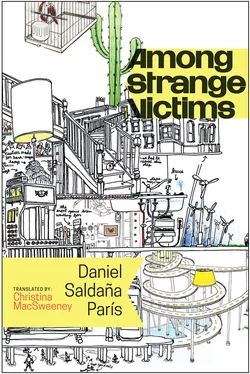That description naturally inspired a justifiable degree of mistrust in Marcelo. In general, Velásquez’s recommendations were difficult to take on board. He had once lent him a movie, “an indisputable classic of the Mexican counterculture,” that turned out to be one of the worst Marcelo had ever seen: women undressing in trucks with slogans like “Fucking Fast”; pallid vampires sweating out-of-focus; overweight heroes. The visionary gringo artist didn’t sound much better, but you never could tell.
They were to meet at the Barraca de Pedro, a restaurant with a simple name but pretensions to haute cuisine, where local dishes were reinvented with a sophistication that, in Marcelo’s opinion, removed all their charm. He had been there a couple of times before, first with Adela and then with Velásquez, and on both occasions he had ended up drunk. The array of tequilas, mezcales, aguardientes, and local wines on offer was almost suicidal. The prices were absurdly low.
Marcelo arrived slightly early, at five to three, and was surprised to see Velásquez already installed at a table, laughing uproariously. It was unusual for him to be on time. The gringo was tall, tanned, and too wrinkled for the age that his bearing and presence suggested; he looked as if he had been weathered by small-town life, and his rough-hewn hands did not in the least suggest the delicacy of the pottery he supposedly worked on. He had long, graying hair tied in a ponytail and was wearing a white shirt of some coarse material, with the sleeves rolled up to just below the elbows, faded denim jeans, and snakeskin cowboy boots. He was also laughing, sitting opposite Velásquez and absentmindedly stroking the leg of an adolescent who couldn’t be more than eighteen (and that was, in fact, exactly how old she was, as Marcelo would discover a couple of hours later, by then infected with the collective jubilation, taking advantage of the girl’s removal to the bathroom to discreetly ask Velásquez her age).
Marcelo introduced himself and shook the rough hand of the gringo, who said his name was Jimmie. He kissed the cold cheek of the adolescent, who didn’t say a single word and whom Jimmie introduced as Micaela. When he sat in the only free chair — facing Micaela, on the right of the gringo — he noticed that already waiting for him were a shot of tequila and a cold beer, still misted from the change of temperature after its removal from the fridge, as if they had calculated his arrival to the exact second.
They talked about anything that came to mind as the waiter brought their dishes and placed them in the center of the table, delicacies Velásquez and the gringo ate with their fingers, Marcelo sampled rather ineptly (they were not designed for his strict use of a knife and fork), and Micaela observed with calculated disdain.
Jimmie was from California, from a town an hour from San Francisco that used to be full of manual workers and was now inhabited by Vietnamese immigrants. He had spent his childhood and teenage years in the Bay Area, surrounded by hippies, and told the story of an elder brother who died in the waves after going swimming while high on drugs. Jimmie was ten years older than Marcelo and had done everything: from cycling across the continent to working as a cleaner in the Apple offices in Silicon Valley. He had been living in Los Girasoles for a couple of years, after an argument in San Miguel de Allende with a landlady from New York who had thrown his things out into the street. “Goddamn son-of-a-fucking-bitch gringos,” said Jimmie, resentful of his compatriots, like any good Californian.
Marcelo talked about Madrid, about the Movida years, about women. He gave Jimmie a summary of his Mexican trip: the relationship with Adela, the house he had unsuccessfully rented and that was now occupied by Adela’s son, his project for a book on Foret’s passage through the country. Velásquez intervened with witty, usually misogynist comments while Micaela sat with a rigid smile on her face and occasionally rested her head on Jimmie’s shoulder. Marcelo attempted to include the girl in the conversation; he asked her what she did. “I study,” she said in a voice that was almost a sigh, and smiled timidly, more for Jimmie than Marcelo.
The afternoon passed quickly, and the lamps of the interior patio of the restaurant illuminated a fountain when darkness finally fell. By this time, Marcelo had developed a tolerance for tequila much greater than he had had on his arrival in Mexico, and he was now able to recognize the moment when the next round would be accompanied by catastrophe. He was far from that point. But not so the gringo, who seemed more affected by the drink, or by life in general. It was he who proposed they move on to his studio, where he kept — he said at the top of his voice — much better tequila than the dog piss they served there. Micaela looked smilingly at him, imperturbable. Marcelo calculated that if the gringo passed out in the restaurant, it would be more complicated to transport him to his bed than if he lost consciousness near that bed, so he seconded the idea of moving on to the studio. He hesitatingly asked Micaela if she needed a ride somewhere else first, but the child shook her head very slowly, swinging her straight black shoulder-length hair, and told Marcelo she lived with Jimmie.
Marcelo offered to drive the five or six blocks that separated the restaurant from Jimmie’s house, and they walked unsteadily over to his car. The gringo had begun to lose his fluidity in Spanish and compensated by inserting words in English; Marcelo noticed, by the change in her expression, that Micaela didn’t understand that language. It was perhaps for that reason, or simply because of his state of intoxication, that Jimmie passed completely into English and told Velásquez and Marcelo, in an awkward confidence, that he had met Micaela near Nueva Francia; the girl’s family was very poor, and she, according to Jimmie, was a brilliant woman, like a Martian, completely unexpected in the familial and social context in which she had been reared. He spoke about her in the way a naturalist would when describing some indigenous flower. Jimmie gave the father five thousand pesos and took the teenager, promising the family they would come back from time to time to visit. “She fucks like an angel,” he added, this time in perfectly clear Spanish, to which Micaela reacted by distancing herself slightly.
The studio was an old building, from the same period and in the same style as Adela’s house but in much worse condition and a great deal smaller. The paint was peeling from the walls, or they had only been painted in patches, and in the kitchen the original roof had been replaced by a sheet of rusty metal that allowed a view of the night sky in places. Luckily, it didn’t rain much in Los Girasoles. All the interior walls, except for the one delimiting the back bedroom, had been knocked through. A number of load-bearing columns divided the elongated space, along which were scattered pots, shards of pottery, and ceramic plates painted with horrendous designs (horses with auras, blue suns, women drawn in profile whose hair metamorphosed into flocks of birds).
Jimmie rinsed out some glasses and carried them, still wet, to what could be considered the living room: three Acapulco chairs set around a low, rectangular table. Each of the men took one of the chairs; Micaela disappeared into the bedroom and came back with some pillows, which she put on the floor to make herself more comfortable.
Indoors, Jimmie seemed more sober, as if only the air-conditioning or the desire to insult the waiters had aroused him for a short time. Now he poured tequila for the other two men (Micaela had taken a can of beer from a small icebox but scarcely touched it) and talked about his projects with relative fluency. He was thinking of organizing an exhibition right there in the studio so that the wealthy residents of Los Girasoles would buy his ceramics. He knew the designs were horrible but defended his right to sell them, alleging that people liked having ugly things in their homes. In fact, added Jimmie to Marcelo (much to the satisfaction of Velásquez, who had been waiting for this moment the whole evening), his real passion was not ceramics but contemporary art; the problem was that in this bleak wasteland it was impossible to explain to the natives (“or even worse, to the academics,” he added scathingly, with a wink to Marcelo) what contemporary art really was. Though he knew, he said, that Marcelo was a man of the world, and in Barcelona (“Madrid, Madrid,” Marcelo interrupted), right, in Madrid then, he must have seen contemporary art projects much closer to his own area of interest. In fact, that was why he had told Velásquez that he wanted to meet him: to invite him to join this new project — the word was repeated like a mantra in his discourse — he was putting together. It was going to be a magnificent exposition, he said, a performance unlike anything that had ever been done before. He had been in training for this for years, although he had only discovered it a short time ago, and only now, said Jimmie, did he understand that all that training was destined for this moment and this place. By “all that training” he was of course referring to a bunch of unconnected anecdotes spiced up with sex and prog rock.
Читать дальше









